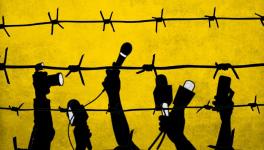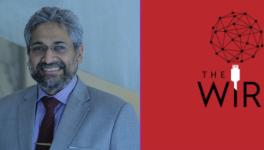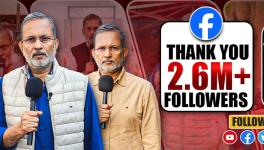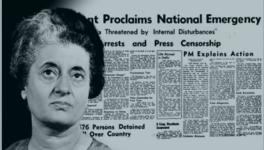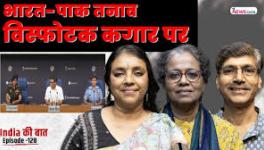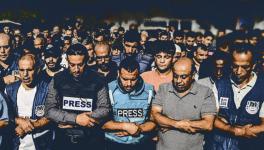World Press Freedom Day: ‘Save Journalism, Protect Journalists’ Rights Day’ Observed in Delhi
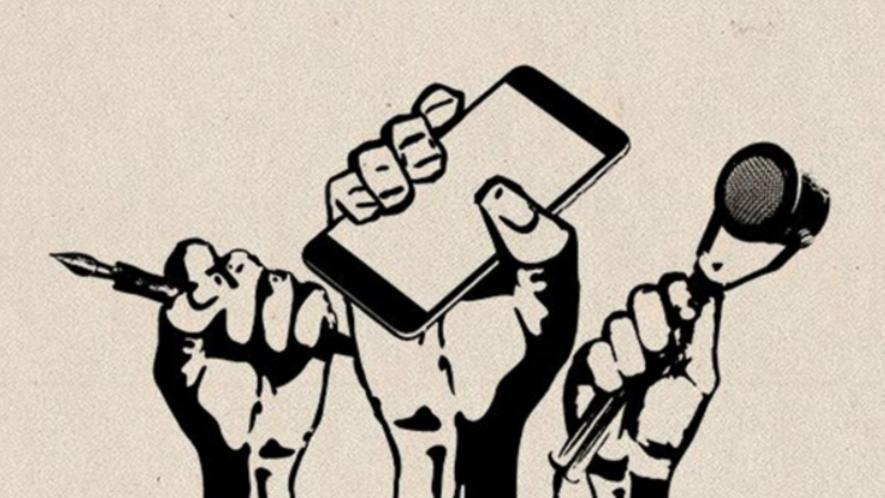
New Delhi: Amid increasing curbs on media freedom and journalists’ rights, journalists in Delhi gathered to observe ‘Save Journalism, Protect Journalists Rights Day’ on World Press Freedom Day, May 3.
The meeting, organised by the Delhi Union of Journalists (DUJ) and National Alliance of Journalists (NAJ), saw participation from several journalist groups, such as the Press Club of India (PCI), Indian Women’s Press Corp (IWPC), Press Association, Kerala Union of Working Journalists (KUWJ) among others.
Addressing the meeting, Gautam Lahiri, president, PCI, expressed concern over denial of access to information under the present regime. He cited the sharp reduction in the number of passes to cover Parliament and restrictions on the rights of accredited journalists to enter Ministries.
“The Election Commission of India has also breached convention by not holding the usual press briefing after each polling day,” he said, calling for solidarity among journalists' bodies to raise collective demands.
S.N.Sahu, columnist and former OSD & Press Secretary to late President K.R. Narayanan, hailed Gandhi and Ambedkar as the greatest champions of press freedom, reminding the audience that Gandhi had launched a satyagraha for freedom of speech.
“After Jallianwala, when the editor of The Tribune faced charges and the Daily Pratap was forced to close down, Gandhi said, a “Doctrine of Frightfulness” was being enforced. Today, we have a replay of the same doctrine to frighten everyone into submission, he said.
IWPC president Parul Sharma regretted the continuing discrimination against women journalists and said they deserved dignity and equality in the profession.
Senior journalist Bhasha Singh said this election was a critical one for democracy. “The Election Commission continues to ignore hate speech and religious polarisation while the corporate-owned mainstream media has become a perception creating industry…that parrots the government line on everything,” she said.
IWPC secretary Binny Yadav said if the media is gagged it cannot inform voters. “Without the ability to question, the country would become a sham democracy,” she observed.
Senior advocate Surendranath, general secretary of All Indian Lawyers’ Union, pointed out how undermining the right to information also undermined democracy. He said that at a time when “crony capitalists have captured much of the mainstream media, countering it is a Herculean task.”
He pointed out that in such a situation, the fight was toughest for independent journalists and organisations, and called for a joint campaign by journalists and lawyers against draconian laws like UAPA, sedition and defamation, which are used to threaten press freedom.
Senior journalist Jaishankar Gupta, former president of Press Association and member Press Council of India, said journalists had long ago surrendered their freedom to their employers who in turn have surrendered to the government. “We live in an undeclared censorship now, not knowing which article or which comment on air will invite punitive action from the authorities,” adding that the Press Council was barely functional, and unable to provide redressal.
Veteran journalist S.K.Pande there was a new McCarthyist Hindutva model operating in the media and acting against independent media.
“Our labour rights are under attack, with the Working Journalists Act and Rules about to vanish. Meanwhile statutory journalist Wage Board cases linger on in the courts. The news agencies are in poor shape, with salary freezes,” he said.
Journalist Dhanasumod, general secretary, KUWJ, said: “When we speak of attacks on individual journalists or independent media we are watching the trees, not the forest. We need to see the larger picture which is the imminent threat to democracy in the country.”
DUJ president Sujata Madhok said there is need for both more solidarity and more networking among journalists and their organisations.
“We should individually do more ‘prachaar’ on WhatsApp, X, Instagram and other social media, forwarding information and calling out fake news. We must work together on drafting and demanding a fair media policy,” she said.
We must publicise all attacks on journalists and draft and demand laws to protect journalists and their rights.
The meeting ended with DUJ secretary Mukund Jha reading out a poignant Hindi poem titled ‘Rona’ by veteran journalist and poet, Kuldeep Kumar, reflecting on the difficult times.
Get the latest reports & analysis with people's perspective on Protests, movements & deep analytical videos, discussions of the current affairs in your Telegram app. Subscribe to NewsClick's Telegram channel & get Real-Time updates on stories, as they get published on our website.









